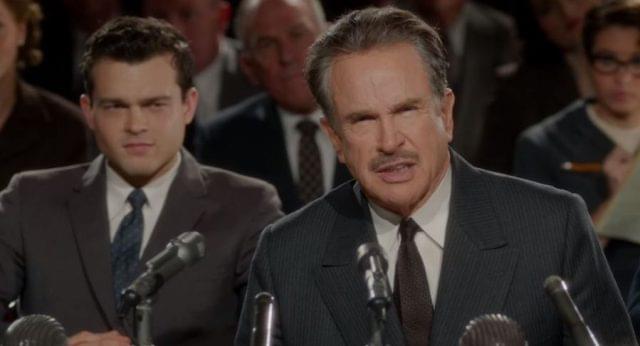
Warren Beatty has been thinking about making a Howard Hughes biopic for 40 years, yet somehow the creaky, lurching “Rules Don’t Apply” is what he came up with. Though rife with glossy Hollywood charm, the film is strangely disjointed and unfocused, seeking to make Hughes (played by Beatty) the main character even though it spends most of its time with his underlings, who end up being largely irrelevant. Whose story are we watching here? More to the point, why are we watching it?
Beatty, who hasn’t been in a movie in 15 years (“Town & Country”) and hasn’t directed one since the 20th century (“Bulworth”), sets his sights on Tinseltown nostalgia. It’s the late 1950s, and Marla Mabrey (Lily Collins), a would-be starlet fresh off the bus from Virginia with her mother/manager (Annette Bening), has been hired as one of Hughes’ many contract players. Marla is set up in a bungalow and given a driver, Frank Forbes (Alden Ehrenreich), who takes her around to meetings that never involve Hughes himself. Frank, a budding entrepreneur, has never met his boss, either, actually, but has a business proposal for him if he ever does.
Frank has a fiancee (Taissa Farmiga) back home in Fresno but naturally finds himself drawn to Marla. They have become friends and co-conspirators by the time Marla finally meets Hughes, who is eccentric and idiosyncratic but not yet fully insane. He insists that his drivers all be regular churchgoers who abstain from premarital sex. His rendezvous with Marla is over TV dinners in a dimly lit hotel room, interrupted by Hughes’ capricious saxophone playing. He’s intrigued when Marla presents a song she has written, “The Rules Don’t Apply,” whose lyrical theme is that you can do anything you want, no matter how old you are, because you are special. There’s no missing why Hughes and the man playing him would both find this inspiring.
It’s nearly impossible to tell what Hughes is thinking, and he does become crazier as the film progresses, but it’s amusing (for a while) to be baffled by him as we poke around the insular version of Hollywood Beatty has created. (Why, there’s Candice Bergen as his secretary, Martin Sheen and Alec Baldwin as business associates, Matthew Broderick as another driver, plus Ed Harris, Oliver Platt, and Dabney Coleman – DABNEY ACTUAL COLEMAN – in assorted other roles.)
Marla and Frank – that is, Collins and Ehrenreich – are far more engaging with their winsome, flirtatious storyline, and are presented as more dynamic characters. But despite occupying most of the screen time, they’re not the ones Beatty wants us to care about. He wants us to care about Hughes, whom Beatty has portrayed as a charismatic, inscrutable, one-dimensional nutjob. There’s a sloppiness to the way the film is edited; time passes irregularly, a day here, six months there; Marla, a staunch teetotaler, is suddenly drunk in one scene, the moment where she decided to chuck it all omitted. And maybe the cutting and pasting accounts for why the protagonists get the short shrift while the wacky side character is positioned as the hero. Who knows what goes on in an old Hollywood legend’s mind?
C (2 hrs., 6 min.; )





